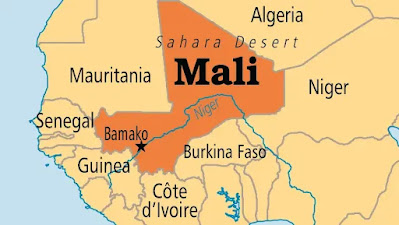Economic
Community of West African States (ECOWAS) on Sunday imposed tough new sanctions
on Mali after reviewing the country’s political crisis. The military junta had
submitted a new timeframe for a transition back to civilian rule at the last
minute after its first proposal was rejected.
The
15-member bloc said it had agreed to impose additional sanctions with immediate
effect. These included the closure of members' land and air borders with Mali,
the suspension of non-essential financial transactions, and the freezing of
Malian state assets in ECOWAS commercial banks and by the central bank of the
eight-nation West African CFA franc zone.
In a
communiqué issued after an emergency summit in Ghana’s capital Accra, ECOWAS
said it found the proposed timetable for a transition back to constitutional
rule totally unacceptable.
The ECOWAS
meeting came after months of increasing tensions over the timetable for
restoring civilian rule in Mali after a military takeover in 2020.
In
August that year, army officers led by Colonel
Assimi Goita toppled the elected president Ibrahim Boubacar Keita amid street protests against his unpopular
rule.
Under
threat of sanctions, Goita
subsequently promised to restore civilian rule in February 2022 after holding
presidential and legislative elections.
But he
staged a de facto second coup in May 2021, forcing out an interim civilian
government.
The
move disrupted the reform timetable and was met with widespread diplomatic
condemnation.
Although
ECOWAS insisted that Mali hold elections in February, the government then said
it would only set an election date after holding a nationwide conference –
arguing that a peaceful vote was more important than speed.
Some
portions of Mali lie outside of state control, with the government struggling
to quell a jihadist insurgency that has raged since 2012.
On 30
December, after Mali’s reform conference ended, the government suggested a
transition period of between six months and five years, starting from 1 January
2022.
This
would enable the authorities to “carry out structural institutional reforms and
(organize) credible, fair and transparent elections”, it said.
But
ECOWAS mediator Goodluck Jonathan
asked the regime to revise that plan during a visit last week, Mali’s foreign
minister said.
On
Saturday, the junta submitted a new proposed timetable to the bloc’s acting
president, Malian state television reported – without giving any details about
its contents.
The
return to civilian rule has put the bloc’s credibility on the line as it seeks
to uphold fundamental principles of governance and contain regional
instability.
At a
summit on December 12, its leaders reiterated demands that the elections be
held by 27 February as initially planned.
They
maintained sanctions such as asset freezes and travel bans within the ECOWAS
region against around 150 junta figures and their families, and threatened
further “economic and financial” measures.
A West
African Economic and Monetary Union summit will immediately precede the ECOWAS
talks in Accra, with its eight members meeting to lead concerted action and
impose new economic sanctions.



















No comments:
Post a Comment
Disclaimer: Comment expressed do not reflect the opinion of African Parliamentary News